The Organization Ain't Really Organized, 1970
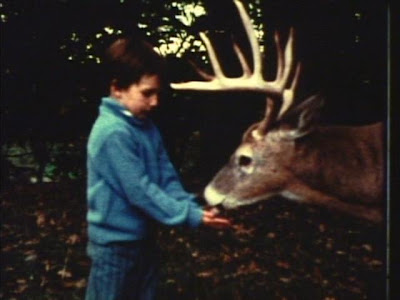 John Ashbery, Song.The Insect Trust, Be a Hobo/Hoboken Saturday Night.
John Ashbery, Song.The Insect Trust, Be a Hobo/Hoboken Saturday Night.
Ornette Coleman Quartet, Forgotten Songs.
Bruce Cockburn, Going To the Country.
Captain Beefheart and His Magic Band, Bellerin' Plain.
Neil Young, Everybody Knows This Is Nowhere (TV rehearsal).
Alice Cooper, Beautiful Flyaway.
The Kinks, Get Back In the Line.
Elaine Stritch and cast of Company, The Little Things You Do Together.
Tim Rose, I've Gotta Get a Message To You.
The Street People, Jennifer Tomkins.
Freda Payne, Band of Gold (alternate take).
Mavis Staples, Chained.
Roebuck "Pops" Staples, Black Boy.
Johnnie Mandel, Suicide Is Painless.
Antônio Carlos Jobim, Amparo.
Miles Davis, Sanctuary.
William Walton, Improvisations On an Impromptu Of Benjamin Britten: moderato.
John Cale, Gideon's Bible.
Donovan, Riki Tiki Tavi.The Sixties ended badly everywhere...But if the Sixties seemed at last to pass unmourned and with few enduring monuments, this was perhaps because the changes that they did bring about were so all-embracing as to seem natural and, by the early Seventies, wholly normal. At the start of the decade Europe was run by and--as it seemed--for old men...Yet within ten years the old men (Churchill, Adenauer, De Gaulle) were dead.Tony Judt,
Postwar.
On that cold Wednesday morning, Rothko's assistant Oliver Steindecker came to work as usual at nine o'clock. He unlocked the door to the studio on 69th Street on Manhattan's Upper East Side and called out a robust "good morning" as he did every day. But on this morning there was no answer. Steindecker went to Rothko's bed, which he discovered to be empty. He searched everywhere, finally going to the section where the kitchen and bath were located, to find Rothko lying on the floor beside the sink, covered in blood, with both of his arms slit open and a razor blade by his side...The autopsy showed that aside from the deep incisions, the artist had also suffered acute poisoning from anti-depressants. He was 69 years old.Jacob Baal-Teshuva,
Mark Rothko 1903-1970: Pictures as Drama.
 Rothko, Untitled (Black on Grey), 1969/1970.The song tells us of our old way of living,Of life in former times. Fragrance of florals,How things merely ended when they ended,Of beginning again into a sigh. Later,Some movement is reversed and the urgent masksSpeed toward a totally unexpected endLike clocks out of control. Is this the gestureThat was meant, long ago, the curving inOf frustrated denials, like jungle foliageAnd the simplicity of the ending all to be let goIn quick, suffocating sweetness? The dayPuts toward a nothingness of sky...
Rothko, Untitled (Black on Grey), 1969/1970.The song tells us of our old way of living,Of life in former times. Fragrance of florals,How things merely ended when they ended,Of beginning again into a sigh. Later,Some movement is reversed and the urgent masksSpeed toward a totally unexpected endLike clocks out of control. Is this the gestureThat was meant, long ago, the curving inOf frustrated denials, like jungle foliageAnd the simplicity of the ending all to be let goIn quick, suffocating sweetness? The dayPuts toward a nothingness of sky...John Ashbery, "Song," from
The Double Dream of Spring, 1970.
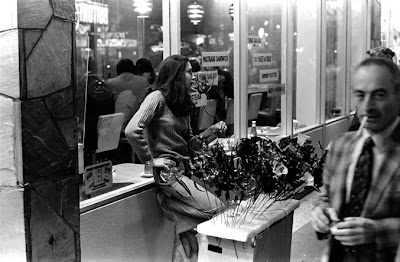 Times Square, ca. 1970.
Times Square, ca. 1970.Our story resumes in New York City in 1970, a city divested by its country. Once the United States' collective aspiration, New York has become the broken compact, an easy shorthand for the news-magazines, used to stand for blight, crime, general menace. Worse, it's come to represent The City itself, and the U.S., which still has a farmer's narrow soul, wants nothing more than to be rid of it.
Life in NYC, ungovernable and forsaken, goes on as it has for much of its history. Its recently-acquired intaglio of decay and menace provide one small benefit---it drives off the speculators and keeps the monied class within its confines. So for some twenty years you could be an artist and actually live in Manhattan.
Or across the river, where in a decaying Hoboken apartment building live a collective of musicians called
The Insect Trust. Most are from Memphis: one, the clarinetist/historian Robert Palmer, is photographed sitting on what seems to be a milk jug--behind him Hoboken looks like a medieval French town but for the telephone lines. Another shot has the guitarist Bill Barth wrapped in a quilt, peering out the window as if the house is surrounded by policemen.
"Be a Hobo" is the Trust's version of a chant by
Louis "Moondog" Hardin, who in 1970 could be found standing on 54th St., usually dressed as a Viking. "Hoboken Saturday Night," the Trust's ode to minor rowdy pleasures, is sung by Nancy Jeffries, whose voice is that of a dedicated enthusiast, of a woman who, suddenly taken by a song she's hearing, sings her way into it.
The two tracks lead off
Hoboken Saturday Night. The band broke apart soon afterward: Trevor Koehler, a saxophonist/flutist who worked with Gil Evans, killed himself in 1976;
Palmer, who died in 1997, wrote
Deep Blues and helped create PBS' 1995
Rock and Roll (still the best rock documentary ever made, still shamefully unavailable (though
pieces of it
are finally turning up)); Barth became a painter in Amsterdam and died in 2000;
Jeffries went into the record industry and signed Suzanne Vega, Deee-lite and Freedy Johnston.
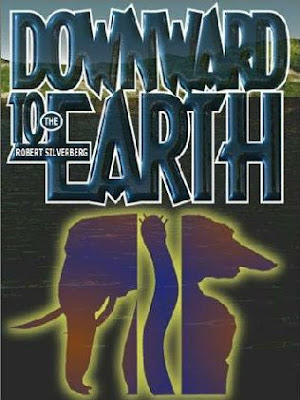
In 1970 Ornette Coleman lived in a loft on 131 Prince Street, in Soho, that he soon would offer up as a practice space and performance hall. Early in the year Coleman and some of his longtime collaborators put on a show for his neighbors: one of the songs, "Friends and Neighbors," featured everyone in the audience singing along while Coleman brutally interrogated a fiddle.
"Forgotten Songs," a fanfare and call to arms, is from the same session--recorded on Valentine's Day, 1970, at 131 Prince St., with Dewey Redman (ts), Charlie Haden (b) and Ed Blackwell (d); on the now out-of-print
Friends and Neighbors. (In 2006, a co-op at
131 Prince sold for $1.5 million.)
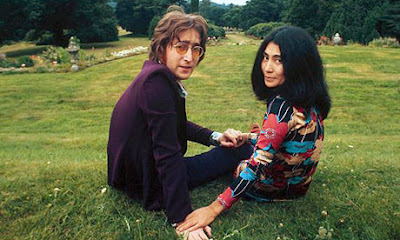 John and Yoko survey the estate, 1970.There is so much light here--his life force pulling us all together, letting himself finally touch; the gentle eyes of the people Van and I love so much smiling...Look at the photographs and marvel, as we do, at the good feeling that radiates from [Van] now--to you all with love...
John and Yoko survey the estate, 1970.There is so much light here--his life force pulling us all together, letting himself finally touch; the gentle eyes of the people Van and I love so much smiling...Look at the photographs and marvel, as we do, at the good feeling that radiates from [Van] now--to you all with love...Janet Planet, liner notes to Van Morrison's
His Band and the Street Choir.
So if the city was evil and irredeemable, it's no surprise that the
age-old dream of the pastoral had returned. (Updike's Rabbit Angstrom, at the end of the decade, snorted that he preferred the new disco to all the Sixties "country" music that "
tried to take us back and make us better than we are"). The record sleeves of 1970 are littered with contented, stoned rock singers posing with their doting hippie wives/girlfriends and their scattered, bewildered children, all standing in farmyards or fields, or arrayed on the back porches of vast houses paid for by royalty advances. Crosby, Stills, Nash and Young wear knock-off Army of the Potomac uniforms for
Deja Vu; Paul and Linda McCartney share snapshots from life on McCartney's Scottish farm; even Dylan wanders alone through the Saugerties landscape on his official bootleg
Self Portrait.Few were immune to it: my parents, two Irish Catholic teenagers who had spent their whole brief lives in New Haven, suddenly decided to move, along with their two-year-old son, to the foothills of the Blue Ridge Mountains. Jack Nicholson jumps on a tractor-trailer heading to Alaska at the end of
Five Easy Pieces; Jimmy Page and Robert Plant hole up in
Headley Grange, writing songs; The Band sing about scurrying back to their Catskill nests in
"Time To Kill" (though the country life would kill Richard Manuel's songwriting, and even Levon Helm got hooked on smack in Woodstock). Neil Young used his 1,500-acre ranch in La Honda, California, as a wall between him and the world (this version of "Everybody Knows This Is Nowhere" was recorded as a rehearsal for a KQED-TV broadcast on 17 February 1970).
Bruce Cockburn's "Going to The Country" offers a variation on the dream, the modesty of its aspirations suggesting that for once the dream could be feasible; on Cockburn's first
self-titled LP.
And Captain Beefheart's "Bellerin' Plain" is a pastoral too, of a sort; on
Lick My Decals Off, Baby! Rafelson, Five Easy Pieces.
Rafelson, Five Easy Pieces.Reincarnation: "
Later I think I'll disappear into another womb/and take a look inside the men's room." Alice Cooper, before he/they was/were shtick (on
Easy Action).
Work: "
All I want to do is make some money/and bring you home some wine/for I don't want you ever to see me, standing in that line." Inspired in part by the humiliations endured by Ray and Dave Davies' father; on The Kinks'
Lola vs. Powerman.
Marriage: "
It's neighbors you annoy together/children you destroy together." Elaine Stritch steers "The Little Things You Do Together," from Sondheim's
Company (original cast LP).
 Eggleston, Sumner, Mississippi (Britt Daniel is a fan).
Eggleston, Sumner, Mississippi (Britt Daniel is a fan).The pop charts were full of God and fear, of lullabies and chants borne by the amoral radio, absently hummed in taxis, crackled through faulty PA systems in beach towns, played on dust-flecked and scratched 45s that were brought to birthday parties or to show-and-tells (one such record bore a jam stain on its B-side, another was cracked into three equal shards after a child foolishly had stowed it in his knapsack). The songs opened like novels, closed like police reports.
The preacher talked with me and he smiled (Tim Rose's cover of "I've Gotta Get a Message to You," is on
Love, a Kind of Hate Story);
dyin' young is hard to take, sellin' out is harder.
There was "Jennifer Tomkins," whose nameless singer worries about "
trouble, trouble everywhere," whose title character is orphaned as a child, betrayed as a teenager. The song started life provisionally titled "Bubblegum Has Come to Town," but its creators (including Rupert Holmes) decided that the bubblegum vogue had ended, and so brought in poor Jennifer, sister to Mary Maguire (put on trial for prostitution) or
Alice or the other lost girls of the late Sixties. (On
25 All Time Greatest Bubblegum Hits).
Or Freda Payne's "Band of Gold," a #3 hit in summer 1970 (
#1 in the UK). Like Bobbie Gentry's "Ode to Billie Joe," from a few years before, its story is only half-told, the rest exists in gaps and silences. A child bride, an impotent (or gay) husband, a quick annulment: it seems to be a fragment of some Victorian domestic horror, a lost family scandal somehow unearthed in the tumult of the late '60s.
This is an earlier take where the elements have yet to gel, as the sitar hook isn't as pronounced and there's an odd bridge that doesn't work (and was scrapped). But Payne is grappling with a song that will make her immortal, and she finally drowns herself in it. (The alternate version shows up in various places like
here.)
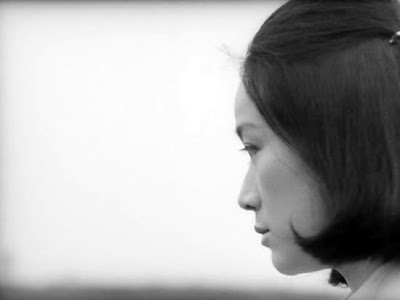 Yoshida, Rengoku Eroica.
Yoshida, Rengoku Eroica.Two of the Staples Singers made solo records in 1970. Mavis tried on some new attitudes ("Chained" is on
Only For the Lonely) while Pops remembered a lost, shameful memory ("Black Boy," released as Stax 0064 c/w "Tryin' Time" in March 1970, is on
Stax-Volt Singles Vol. 2.
 Hepworth, The Family of Man (Yorkshire Sculpture Park).
Hepworth, The Family of Man (Yorkshire Sculpture Park).Soundtracks: Johnnie Mandel's "Suicide Is Painless" is from Robert Altman's
M*A*S*H, its lyric written by Altman's 14-year-old son. On
M*A*S*H OST.
Antônio Jobim was hired by Paramount to compose a few songs for a Hollywood mortuary piece called
The Adventurers, an adaptation of a Harold Robbins novel. One of Jobin's pieces was his love theme "Amparo," a gorgeous nocturne with Jobim on two keyboards and Hubert Laws on flute. The song will survive us, the film is scarcely remembered, the book is already forgotten. Recorded 16 March 1970 (with Ron Carter on bass); on
Stone Flower.
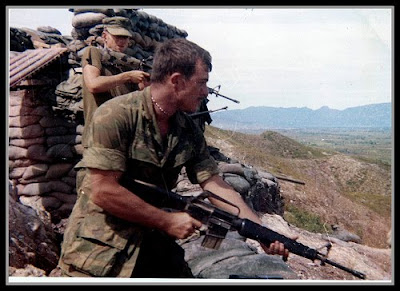 Holding the line, Vietnam, 1970.
Holding the line, Vietnam, 1970.Variations: in the depths of Miles Davis' churning set on the last night of a stint at the Fillmore East, the concerts that established Davis as the jazzman for the rock age, Davis offered an eerie, brief rendition of Wayne Shorter's "Sanctuary."
Recorded 20 June 1970, with Steve Grossman (soprano sax), Chick Corea (electric piano), Keith Jarrett (organ), Dave Holland (b), Jack DeJohnette (d), and Airto Moreira (perc). On
At Fillmore.
The British composer William Walton, in the summer of 1969, composed a variation on a theme that he had heard decades before from his countryman, friend and rival Benjamin Britten. He originally entitled it
Elegiac Variations but decided the piece deserved a happier ending.
Here is the third movement,
moderato. The piece was premiered by Josef Krips in San Francisco on 14 January 1970 and is performed
here by the London Philharmonic (Raphael Wallfisch, cond.).
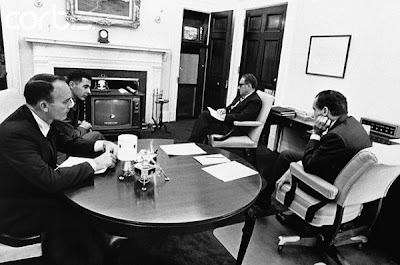 Richard Nixon and staff watch the splashdown of Apollo 13.Vintage Violence
Richard Nixon and staff watch the splashdown of Apollo 13.Vintage Violence is John Cale's bubblegum record: "Cleo" could be a 1910 Fruitgum Company song; "Big White Cloud" is bizarro Phil Spector. Cale wrote and recorded the songs at a pace, trying and failing to write songs that could be played on the radio.
Everything was slightly off--the lyrics seemed badly translated from another language ("my power amphibious bride," "someone took the tuba for a pony ride"), the production ranged from the pristine to the murky. Cale sang love songs from a man stuck in Australia, offered thoughts on death, recalled time spent in barrooms and hotels, told ghost stories. "Gideon's Bible" is as unknowable as the rest.

In Tove Jansson's Moomin novels, there's a character named
Snufkin, a slight figure in a long coat who wears a wide-brimmed hat he's owned since birth: he arrives with the spring and departs for the south when the leaves start to turn. Donovan played this role in the 1960s, and as the times changed he wrapped up his few belongings, belted his coat and went off along the southern road, leaving the valley towns to contend with the winter and the floods. He left a note by the door, but no one cared to read it. (On
Open Road.)
Top: Frame from Jack Chambers'
The Hart of London, 1970. See film
here.













